"I would say that the character that Benedict plays, he brings such
an incredible power to it. His voice alone, I actually as a joke should
have had him read the lunch menu... He makes anything sound great
and brings such a force to it that hopefully when you see the movie,
this character, all speculation aside, will be really compelling." |
Director J.J. Abrams |
Cards on the table (Fizz Bin perhaps?), it's time to reveal my Trek credentials. I'm a fan. I don't dress up but have the replica phasers. Raised on Classic and its cinematic offshoots, thrilled by The Next Generation and Deep Space Nine, I lost my way a little with Voyager and couldn't get past Enterprise's main theme (jeez, the righteous horror of that song). So the title of this review should hint to fellow Trekkies/Trekkers that I am in two minds about the latest Trek so much so that I feel the need to split my review – there's a brief one for relative newcomers to the whole Trek world (and in reboot terms it's still a world and not a universe) and another slightly less brief one for those immersed in Trek lore to the degree that the numbers 1701 can never bring to mind a little after five in the afternoon.
So for those with only Abram's reboot as their Trek intake...
Star Trek Into Darkness
(sans baggage... reviewed as a stand alone sequel) |
|
If 2009's Star Trek was the introduction to (and the start of) the curious but tentative courtship of the two men at the heart of the movie's appeal, then Into Darkness is the fully ignited bromance. Both Captain Kirk and First Officer Spock acknowledge and affirm their friendship amid chaotic events brought about by a genetically modified super soldier, John Harrison, played with theatrical and physical zeal by the rebooted Sherlock himself, Benedict Cumberbatch. Please see the Post Script for more on the actor behind the villainous scowl and mysterious intent.
On an away mission, Kirk and his ship have to reveal themselves to a primitive culture to rescue Spock. As the Starfleet Prime Directive states that this is a serious no-no, Kirk omits to mention it in his report while Spock, incapable of lying, doesn't in his own. Subsequently Kirk is demoted and he and Spock are bound for different ships and different missions until a massive explosion occurs in London followed by a vicious aerial attack prompting Starfleet to mount a covert mission to find their renegade agent and interestingly without legal intervention, snuff him out. To reveal much more in terms of plot will rob the movie of significant pleasures, large and small so I'll leave it at that.
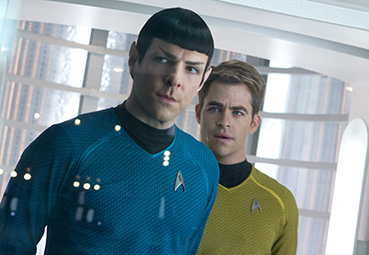
As you might expect from a well-budgeted Hollywood movie, the action is superbly and handsomely mounted. Good sense whacks you in the stomach a few times, asking to be taken into consideration. Curiously, good sense never has any luck in Hollywood. It's all in the interests of putting something cool on the screen instead of thinking about justifying it dramatically and logically. I don't know much about gravity or inertia but there's a fair amount of screwing with both in the picture not that anyone cares a jot about that. But when was Star Trek ever about valid science? Yes, Abrams' damned lens flares are still all over the place (seriously J.J., what's the bloody deal here?), the bridge still reminds me of Star Trek by way of the Early Learning Centre and most silly of all is the reintroduction to the bowels of the ship, which still look like a bloody brewery. Although I was harsh on the score in the first movie, I admit, Trek is tough to musically underline but I will say that Michael Giacchino does a great job on the sequel. Aside from those three relatively minor quibbles, everything else feels just right. Persuading me that the slender slip of a man, Cumberbatch, could pass as a super soldier was always going to be tricky considering in my mind he's always Captain Crieff (see Post Script) but the filmmakers do a superb job. He's really dangerous in the role. I felt for him after he required strenuous preparations for a shirtless torso scene with a prescribed intense gym and diet regime... The scene never made the final cut.
Director Abrams has had the luxury of the first film's success behind him and can now assert his own sensibility on to the almost mythic material he's been hired to coral. And his cast does him proud. Not only does Cumberbatch wear the villain's black attire with Shakespearean gravitas and just enough Trek-patented scenery chewing, every other role is performed with a lightness of touch that keeps the movie buoyant with humour and verbal fireworks. Not a word from Karl Urban's McCoy ends without a smile or a laugh. Simon Pegg's Scotty, though played mostly for humour, nabs the movie's second most effective emotional grenade. It's a look on a face, subtle but it'll register. Chris Pine's Kirk is less self-assured and more willing to lower himself on the altar of humility (in other words, he's growing up). He even, as Captain, apologises to his crew – a first. The real stand out is Zachary Quinto as Spock. He has managed to create a new Spock (Nimoy's 'Prime' version would be embarrassed by some of Quinto-Spock's emotional outbursts) but in a positive way. Spock is still 'forming', still growing into Vulcan-manhood and Kirk's friendship is as required as Spock's is to Kirk. These are two men who recognize in each other their own yin to the other's yang and it's wonderfully played – in one scene, even during disagreements via petty domesticity. In a tense and dangerous situation in a ship flying over a barren part of the Klingon home world, Spock and his partner, Uhura (a glowing Zoe Saldana) bicker about emotions and Kirk's line as a reluctant go-between is priceless. There's no doubt that there's a lot of fun to be in had from the characters and their ironic but well meant asides. It's this aspect that keeps the movie from being one action set piece after another, the curse of modern action cinema. How can you not love a movie in which a senior officer actually orders his friend to stop using metaphors?
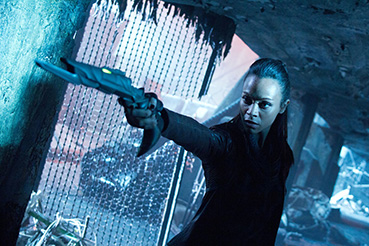
When it comes to the bigger picture, you'll be hard pressed to find a movie this summer that will deliver more than what was promised as this one. It stays resolutely within Trek's accepted ballpark but considering the very title of the franchise, it doesn't actually trek in the way earlier adventures did but that's a minor gripe. It's not as techno-smart and as savvy (or as Shane Blacky) as Iron Man Three but then it's Star Trek and as such should be about hope and optimism for the future.
The future's in good hands.
Star Trek Into Darkness
(avec baggage... a vast forty-seven year body of work boring in to one man's poor shoulders, soon to have Skywalker and company added to them) |
|
I had the odd pleasure of watching this movie with someone who had not seen The Wrath Of Kahn. Wow. In my own desperately narrow worldview, I figured everyone had seen it. Twice at least. I found this out only as we were walking back to the Galileo, ah... my car. I'll keep the Trek-savvy smart-arsery to a minimum. Well, I'll try to. His insight into the film was unencumbered by a solid history with the franchise, unlike mine, one which spanned from the sixties rejected pilot number one through to the chronic let down, thirty six years later, that was Nemesis. I think he really enjoyed it and it was his enjoyment that prompted me to try and promote Into Darkness through less cynical eyes hence the relatively unbiased review above. But now, let's get into the velour pit while still retaining a respect for what director Abrams' own mission was – to keep the fans happy and broaden the audience. It's in trying to do the former he's actually hurting his own narrative. In distilling material from another source (regardless of its legitimacy), he's not allowing his own unfettered imagination to soar. He's trying to score goals with someone else's boots on and though they still count, it's not quite as satisfying.
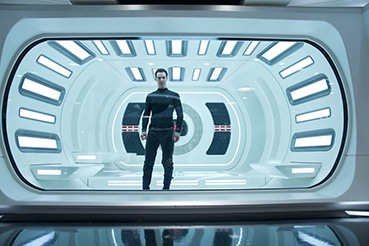
As much fun as I had watching Abrams' 2009 reboot, the thrust of my review was that I saw nothing new in it. It still bothers me that a significant chunk of content – in both of Abrams' exciting and dramatically successful updates to the alternative Trek canon – remain resolutely on Earth. Where is the actual trekking? To boldly go where no one had gone before? San Francisco? With the exception of Doctor Who (an alien in a wooden box who can go anywhere in any time), Star Trek – with its 'lots of people in a big, oddly shaped tin can, are able to go anywhere and sometimes in any time' – has the most expansive (and therefore correspondingly expensive) format of any dramatic premise. These people can go anywhere in the universe and that means (isn't it obvious?) aliens, different planets, adventure like no other, drama like no other. Trek over the years has featured resolutely humanoid aliens for obvious make up and budgetary reasons. But now the universe itself is the limit. Can we climb out of the shackle of 'danger to Earth' and do some genuine exploration now? It seems not. That's for sequel number two, one assumes. OK, Into Darkness starts on an alien planet but it doesn't take too long before we are resolutely earthbound again.
Big intake of Trek breath...
OK, heresy perhaps but I honestly think that you'll have more fun in the cinema if you know very little or next to nothing of 'classic' Trek.
If I were able to box and jettison my memories of the original series and one film in particular of the six featuring the classic cast, I would have been hugging myself with glee coming out of the screening of Into Darkness. It's when the film nods and winks at its classic counterparts – sometimes recreating whole scenes with a few twists – does the movie come emotionally unstuck (for the faithful, you understand, not the Trek newbies). Once you realize what Abrams and his writers are up to, your visceral reaction to certain moments prompts a thirty-one year old emotional re-run (and yes, I can't vague that up any more without being guilty of spoilage). It's a fine line J.J. is gingerly traversing – pleasing the hard-core, inviting and welcoming the soft-core while still crafting a hugely entertaining movie regardless of expectations. This he has certainly achieved. The film is world class in all departments with a few small caveats which I will chalk up to my age, the filmmakers' exuberance and a small matter of dispensing with logic entrenched successfully in the first film. I wanted to gloss over certain inconsistencies but find it harder than ignoring the rampant silliness in Prometheus (or as Joss Whedon called it, Promeaningless).
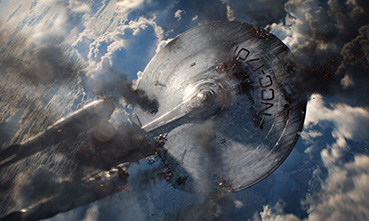
Sorry but... how can a gifted Russian helmsman, who sprints to a transporter console to rescue Kirk and Sulu as they plummet to their deaths in the first movie, fail to lock on to two slow brawling men on Earth? Hear my gnashing of teeth. "They're moving so much, I cannot get a lock on them..." Oh, please. The transporter was always a dramatic pain in the ass. As soon as our heroes could be whisked into trouble they could be legitimately whisked out of trouble. Hence the constant "Oh, the Captain's been knocked out..." in the original series. But this diminishing of a key character for the sake of dramatic closure at this climatic battle blasted me out of the movie and therefore out of the caring game. And in the space set finale, both enemy ship and Enterprise fall to Earth (no secrets revealed here, one's in the trailer and the other's in the poster).
Excuse me?
How does Earth’s gravity suddenly grab them while they’re in space? Apologies but that bit of stupidity stuck in my craw. I’m sure I must have missed some technobabble that told me that if the crystals weren’t aligned by the oscillation overthruster etc. (there’s a clue to the bad guy, right there...) or some sign that they were orbiting Earth (I’m sure I remember seeing the moon somewhere along the line) but I did enjoy Scotty running up the corridor walls.
And as for the 'identity' of the villain aspect, something so hotly debated and pored over in the pre-publicity... Is it Kahn? Is it Gary Mitchell? How does it change your anticipation or enjoyment of the movie? I am utterly unmoved. I don't care who he is or isn't. I care if he or his actions make me care. Thanks to Cumberbatch's 'John Harrison', they did. On the film's IMDB page and the movie's own Wiki entry, it states quite categorically who the villain is and so let's just let that be and get on with an appreciation of all that is terrific about the film. I mean, who cares if X is Y or A is B? Does it matter? Or even anti-matter? We're on a different timeline now folks, so all bets are off. I just wish Abrams would close the canon cookie jar a little tighter for sequel number two.
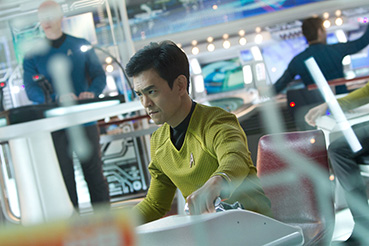
Star Trek Into Darkness is a terrific summer blockbuster that tells its story at a lightning-fast pace with outstanding visual effects and an ear-busting mix (in space, apparently, everyone can hear you explode). Technically, the film is faultless and each of the ensemble cast gives it his/her all. So what's not to like? Abrams and his writers' insistence that his reboot must be tethered to canon Trek to keep the hardcore happy is turning out to be a Pyrrhic strategy. The more squeezed and (let's be frank) nicked from classic Trek, the less his own characters can define themselves within their own universe. Let Chris Pine's Kirk start to do Chris Pine Kirk stuff and not be governed by an oversensitive respect for the efforts of Shatner and co. They have had their moment in the sun (and we still love them for it). Loosen up, J.J. and give your new crew an original adventure. They'll love you for it. Boldly go where no one has gone before. You know you want to.
...and now lastly to my favourite Captain.
*
A Brief Benedict Cumberbatchian Post Script:
Those chronically uninterested in the actor playing the antagonist in the movie, please forgive the following. For those who love comedy, read on.
Life has its moments and it's especially satisfying to me that actor Cumberbatch came to Abrams' attention because of his voice (that and a hastily iPhone-shot scene read in his own kitchen as an audition piece securing him the antagonist's role). Before the multi-syllabled thespian snagged the career defining and career blasting off rocket that is BBC's Sherlock, he played (and still plays) the part of a man desperately insecure, a man with a long held wish to fly and a man whose own desperation had pushed him into a job he agreed not to be paid for. Captain Martin Crieff, I salute you. This is the Benedict Cumberbatch I was introduced to five years ago and it astonishes me to this day that he has kept playing this character over four series since 2008 while his personal and professional stock rose faster than anyone could have imagined. After stints with Spielberg in War Horse and Peter Jackson on The Hobbit (a motion captured dragon, what a part!) he still returned to perform in this this gem of a radio sitcom, Cabin Pressure. Wiki it! He's missed only one recording out of twenty-five and ironically that was through illness not the impossibility of geographically challenged filming schedules (his replacement, Tom Goodman-Hill, did an excellent job in that one episode by the way). I know you're here for Star Trek but, if it's laughter you're after (really sorry about that) check out the exploits of a smaller scale flying machine, Gertie and the even smaller team of MJN Air and discover Cumberbatch's nuanced flair for comedy and a rich vein of gentle but wonderfully crafted humour. To the writer and performer, John Finnemore, my cap is permanently doffed. Cabin Pressure... I'll say no more. For now.
|